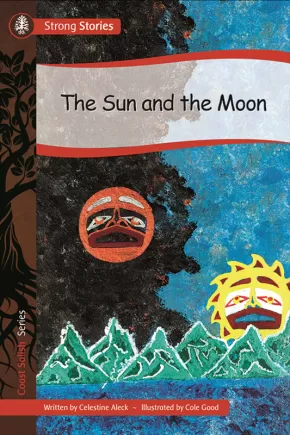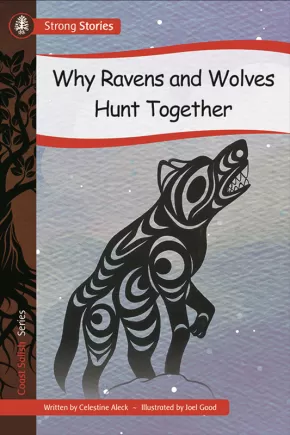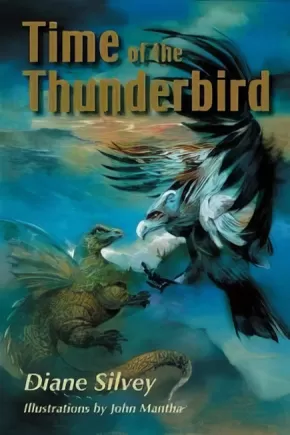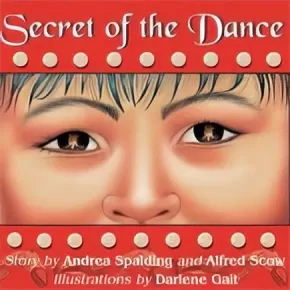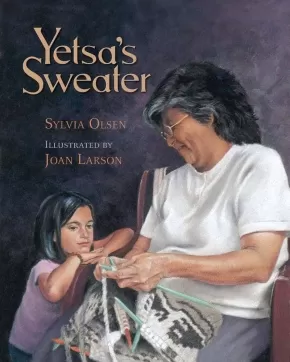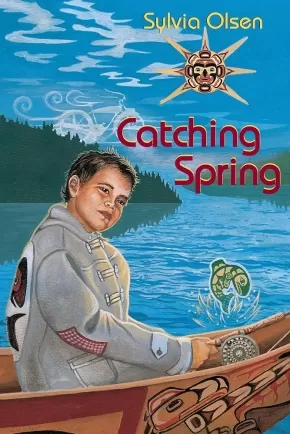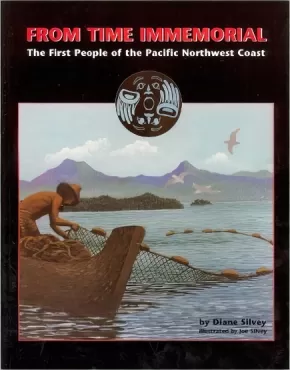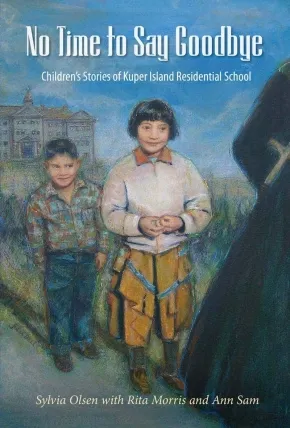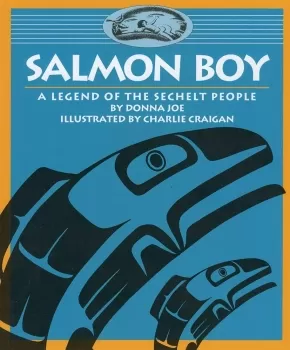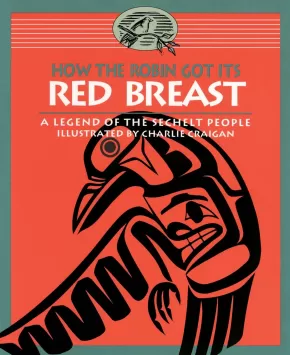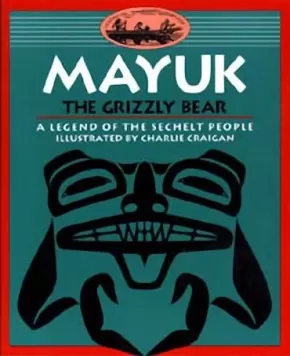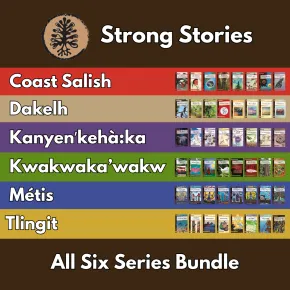
Coast Salish
61
-
72
of
72 Results;
Sort By
Go To
of 5
Strong Stories Coast Salish: The Sun and the Moon
 $9.95
$9.95

Artists:
Format:
Paperback
Text Content Territories:
Indigenous American; Native American; Salish; Coast Salish; Indigenous Canadian; First Nations; Salish; Coast Salish;
ISBN / Barcode: 9781771741262
Synopsis:
Synopsis:
In this Coast Salish story, to help make their children happy, the sun and the moon make the difficult choice to part from each other. The Creator allows them to visit only at the time of an eclipse and at sunrise and sunset. The great love between the sun and the moon can be seen in the beauty of those times.
Educator & Series Information
The Sun and the Moon is part of the Strong Stories: Coast Salish series. Strong Stories focus on different First Nation territories from across Canada and the United States. These stories reflect the belief that our stories are the roots of our people, our lands and our cultures. It is from our stories that we grow and become strong and proud.
This resource is also available in French: Le Soleil et la Lune.
Additional Information
16 pages | 6.00" x 9.00" | ISBN: 9781771741262
Strong Stories Coast Salish: Why Ravens and Wolves Hunt Together
 $9.95
$9.95

Artists:
Format:
Paperback
Text Content Territories:
Indigenous Canadian; First Nations; Salish; Coast Salish; Indigenous American; Native American; Salish; Coast Salish;
ISBN / Barcode: 9781771741231
Synopsis:
Synopsis:
In this Coast Salish story, a wolf pup is transformed into a raven so that he can help his mother hunt during the long winter months. When the time of hardship is over, the Creator agrees to make the transformation permanent. To this day, you can hear the wolf family calling out to say goodnight to the raven who watches over them.
Educator & Series Information
Why Ravens and Wolves Hunt Together is part of the Strong Stories: Coast Salish series. Strong Stories focus on different First Nation territories from across Canada and the United States. These stories reflect the belief that our stories are the roots of our people, our lands and our cultures. It is from our stories that we grow and become strong and proud.
This resource is also available in French: Pourquoi les corbeaux et les loups chassent ensemble.
Additional Information
16 pages | 6.00" x 9.00" | ISBN: 9781771741231
Time of the Thunderbird
$11.99
Format:
Paperback
Text Content Territories:
Indigenous Canadian; First Nations; Salish; Coast Salish;
ISBN / Barcode: 9781550027921
Synopsis:
Synopsis:
Kaya and Tala, the adventurous twins, are back from their exploits in Spirit Quest on a new mission to discover why children are disappearing from one of their tribe''s villages. Earth dwarves are being blamed for the missing children, but the twins are sure they''re not at fault. Something very sinister is happening, so once again the sister and brother set out with Yahet (Y for short), their friend and companion, to rescue the kidnapped children. Along the way they meet a mysterious owl, a cedar ogre, demons galore, Aixos, the most ferocious of all sea serpents, and the Thunderbird himself!
Additional Information
88 pages | 6.00" x 9.00"
Secret of the Dance
$12.95
Artists:
Format:
Paperback
Text Content Territories:
Indigenous Canadian; First Nations; Kwakwaka'wakw (Kwakiutl); Kwicksutaineuk ;
ISBN / Barcode: 9781554691296
Synopsis:
Synopsis:
"Many years ago, when the world and I were younger, my family defied the government."
A boy will never forget witnessing a forbidden Potlatch. In 1935, a nine-year-old boy's family held a forbidden Potlatch in faraway Kingcome Inlet. Watl'kina slipped from his bed to bear witness. In the Big House masked figures danced by firelight to the beat of the drum. And there, he saw a figure he knew. Aboriginal elder Alfred Scow and award-winning author Andrea Spalding collaborate to tell the story, to tell the secret of the dance.
Educator Information
"This story tells of a time when potlatches, ceremonial dancing and the wearing of regalia and masks were forbidden by Canadian law. A young boy, based on Judge Alfred Scow's boyhood story, witnesses the last secret potlatch of this community before the threat of imprisonment caused them to stop dancing." - FNESC, "BC First Nations Land, Title, and Governance"
Additional Information
32 pages | 9.00" x 9.00"
Yetsa's Sweater
$12.95
Artists:
Format:
Paperback
Text Content Territories:
Indigenous Canadian; First Nations; Salish; Coast Salish; Cowichan;
ISBN / Barcode: 9781550392029
Synopsis:
Synopsis:
On a fresh spring day, young Yetsa, her mother and her grand-mother gather to prepare the sheep fleeces piled in Grandma's yard. As they clean, wash and dry the fleece, laughter and hard work connect the three generations. The reader joins this family in an old, but vibrant tradition: the creation of a Cowichan sweater.
Additional Information
|
Catching Spring
$7.95
Format:
Paperback
Text Content Territories:
Indigenous Canadian; First Nations; Salish; Coast Salish; Saanich (WSANEC); Tsartlip;
ISBN / Barcode: 9781551432984
Synopsis:
Synopsis:
The year is 1957, and Bobby lives on the Tsartlip First Nation reserve on Vancouver Island where his family has lived for generations and generations. He loves his weekend job at the nearby marina. He loves to play marbles with his friends. And he loves being able to give half his weekly earnings to his mother to eke out the grocery money, but he longs to enter the up-coming fishing derby. With the help of his uncle and Dan from the marina his wish just might come true.
Educator Information
Themes: contest, family, fishing, Indigenous.
Educator & Series Information
This book is part of the Orca Young Readers series, which are award-winning, bestselling chapter books for ages 8–11. Titles in this series include historical and contemporary stories with age-appropriate plots.
Additional Information
128 pages | 5.00" x 7.50"
From Time Immemorial: The First Peoples of the Northwest Coast (7 in Stock)
$29.95
Artists:
Format:
Paperback
Text Content Territories:
Indigenous Canadian; First Nations;
ISBN / Barcode: n/a
Synopsis:
Synopsis:
From Time Immemorial provides an honest and up-to-date survey of the history of the coastal First Nations from pre-contact to the present. The culture of the coastal people was highly complex. Although there were many similarities, there were also many differences among the groups who shared the wealth of their life-sustaining environment.
This book provides a broad overview of traditional ways common to a large number of diverse groups. It encourages readers to learn more about particular groups who, long ago, walked the shorelines and forest trails of the Pacific Northwest.
Educator Information
From Time Immemorial has been recommended by the First Nations Education Steering Committee of BC as an “authentic First Peoples text that meets provincial standards and reflects First Peoples knowledge and perspectives in a respective way.”
It has also been recommended by Literacy BC: “It’s easy to see why this text, which is accessible for fundamental level students, was also awarded the British Columbia 2000 Book Award.” Jan Weiten notes, “[This] is such an ambitious project. Both Diane and Joe Silvey have honoured the spirit and history of First Nations people, and they should be proud of themselves. This is definitely an asset to any classroom.”
From Time Immemorial meets or exceeds all of the Learning Standards for the new BC Grade 3 Social Studies curriculum and the First Nations content for grades 4-8:
- Learning about indigenous peoples nurtures multicultural awareness and respect for diversity
- People from diverse cultures and societies share some common experiences and aspects of life.
- Indigenous knowledge is passed down through oral history, traditions, and collective memory.
- Indigenous societies throughout the world value the well-being of the self, the land, spirits, and ancestors.
Recommended Grades: 3-8.
A teacher's guide for this book was available, but is now out of print: From Time Immemorial Teacher's Guide
This resource is also available in French: De Temps Immemorial: Les Premiers Habitants de la Côte Nord-Ouest du Pacifique. A French Teacher's Guide is also available here: Guide de la'enseignant(e) De Temps Immemorial.
Additional Information
92 pages | colour illustrations, photos, and maps
No Time to Say Goodbye
$12.95
Format:
Paperback
Text Content Territories:
Indigenous Canadian; First Nations; Salish; Coast Salish; Saanich (WSANEC); Tsartlip;
ISBN / Barcode: 9781550391213
Synopsis:
Synopsis:
No Time to Say Goodbye is a fictional account of five children sent to aboriginal boarding school, based on the recollections of a number of Tsartlip First Nations people. These unforgettable children are taken by government agents from Tsartlip Day School to live at Kuper Island Residential School. The five are isolated on the small island and life becomes regimented by the strict school routine. They experience the pain of homesickness and confusion while trying to adjust to a world completely different from their own. Their lives are no longer organized by fishing, hunting and family, but by bells, line-ups and chores. In spite of the harsh realities of the residential school, the children find adventure in escape, challenge in competition, and camaraderie with their fellow students.
Educator Information
Recommended for ages 12+ by the publisher.
Additional Information
175 pages | 5.25" x 7.75" | Paperback
Salmon Boy
$12.95
Artists:
Format:
Paperback
Text Content Territories:
Indigenous Canadian; First Nations; Salish; Coast Salish; Shishalh (Sechelt);
ISBN / Barcode: 9780889711662
Synopsis:
Synopsis:
In Salmon Boy: A Legend of the Sechelt People, a young boy is captured by a Chum salmon and brought to the country of the salmon people-a dry land beneath water where "the salmon people walked about the same as people do above the sea." The boy lived with them for one year, and his captivity becomes a source of learning that will ensure the survival of his own people.
After accompanying the salmon people on their run, the Sechelt boy hops out of the river and returns home to teach everything he has learned to his people who, from that time forward, treat the salmon properly and always have enough to eat. The salmon people, now respected by the humans, happily "give their rich flesh to feed the people of the land."
This beautiful story is accompanied by black and white illustrations of the boy and his adventures. Though written especially for children, Salmon Boy, with its simple message of responsibility and respect, will appeal to all ages.
Educator Information
Simple and compelling First Nations drawings illustrate this dynamic story that teaches respect for the environment and describes the life cycle of the salmon.
Series Information
This book is part of the Legends of the Sechelt Nation series.
Additional Information
24 pages | 7.00" x 8.50"
How the Robin Got Its Red Breast
$12.95
Artists:
Format:
Paperback
Text Content Territories:
Indigenous Canadian; First Nations; Salish; Coast Salish; Shishalh (Sechelt);
ISBN / Barcode: 9780889711587
Synopsis:
Synopsis:
These traditional teaching legends come straight from the oral traditions of the Sechelt Nation. Simple enough to be understood by young children, yet compelling enough for adults, they are gentle, beautifully presented cautionary tales. You'll want to read them again and again - and you'll learn a few words of the Shishalh language while you're at it.
Reviews
"Long ago, when groups of people were living in caves to keep their families fed and warm, young men set out to search for food. After days of staying awake to keep the fire going, the grandfather left in charge fell asleep, and the fire grew dim. The resident brown robin found everyone asleep the next morning with the embers barely lit. This traditional story tells how the courageous little gray robin saves the people, and is honored with the color given him." - Oyate
Series Information
This book is part of the Legends of the Sechelt Nation series.
Additional Information
40 pages | 7.00" x 8.50"
Mayuk the Grizzly Bear
$12.95
Artists:
Format:
Paperback
Text Content Territories:
Indigenous Canadian; First Nations; Salish; Coast Salish; Shishalh (Sechelt);
ISBN / Barcode: 9780889711563
Synopsis:
Synopsis:
These traditional teaching legends come straight from the oral traditions of the Sechelt Nation. Simple enough to be understood by young children, yet compelling enough for adults, they are gentle, beautifully presented cautionary tales. You'll want to read them again and again - and you'll learn a few words of the Shishalh language while you're at it.
Reviews
"In the naming of his great-grandson, a grandfather relates the story of how Mayuk met his match at the hands of three brothers, and how one, who was wounded, was healed by Indian medicine. To celebrate his survival, the grandfather named his grandson Mayuk so he would have the attributes of that animal. That this book is a story within a story within a story within a story is a common Northwest Coast oral history device." - Oyate
Series Information
This book is part of the Legends of the Sechelt Nation series.
Additional Information
40 pages | 7.00" x 8.50"
Strong Stories - All Six Series - Single Set Bundle
 $429.84 $477.60
$429.84 $477.60

Text Content Territories:
Indigenous American; Native American; Haudenosaunee (Iroquois); Kanyen'keha:ka (Mohawk); Salish; Coast Salish; Alaska Native; Tlingit; Indigenous Canadian; First Nations; Dene; Dakelh (Carrier); Haudenosaunee (Iroquois); Kanyen'keha:ka (Mohawk); Tyendinaga; Kwakwaka'wakw (Kwakiutl); Salish; Coast Salish; Tlingit; Métis;
ISBN / Barcode: 9781771746618
Synopsis:
Synopsis:
This bundle includes all six Strong Stories sets. You will receive one copy of each book in the six sets (48 books total).
Listed below are the Strong Stories sets (and the titles included within each) that you will receive in this bundle:
Coast Salish Stories
Granny and I Get Traditional Names
Mom, How Do You Make Smoked Fish?
Why Ravens and Wolves Hunt Together
Taking Care of Our Mother Earth
The Cedar Tree: The Heart of Our People
The Great Blanket of Moss
The Great Trade
The Sun and the Moon
Dakelh Stories
Bald Eagle, Bald Eagle
Berries of the Dakelh Territory
Berry Picking with ‘Atsoo
Counting in Carrier (delivered in a dual-language format of Carrier and English)
Fall in Saik’uz (delivered in a triple-language format of Carrier, English, and French)
Spring in Saik’uz (delivered in a triple-language format of Carrier, English, and French)
Summer in Saik’uz (delivered in a triple-language format of Carrier, English, and French)
Winter in Saik’uz (delivered in a triple-language format of Carrier, English, and French)
Kanyen'keha:ka Stories
Big Bear
Kanyen’kehà:ka Clans
Creation Story Sky Woman
The Thanksgiving Address
The Game
The Three Sisters
The Woodpecker
Two Row Wampum
Kwakwaka’wakw Stories
A Kwakwaka’wakw Potlatch
Button Blankets
Hereditary Chiefs and Matriarchs
Our Traditional Medicines
Planning a Kwakwaka’wakw Potlatch
Strength in Our “Ways of Knowing”
The Cedar Tree Our Culture, Our Tree
Traditional Berry Picking
Métis Stories
How the Moon Came to Be
Métis and Dandelions
Métis Singing Sticks: A Story About Métis Musical Traditions
Pemmican Berries
Poems to Honour Mother Earth
The Helpful Sasquatch
Métis Transport Boxes
The Story of the Tamarack Tree
Tlingit Stories
Gift of the Salmon
Hong Kong Story Totems
Making a Canoe
Making a Drum
Raven Returns the Daylight
Spirit Bear
Tlingit Fishing
Tlingit Storytellers
Educator Information
Books in this set are recommended for primary to intermediate students.
For the books containing Carrier, downloadable pronunciation guides are available:
Spring in Saik'uz Pronunciation Guide
Summer in Saik'uz Pronunciation Guide
Fall in Saik'uz Pronunciation Guide
Winter in Saik'uz Pronunciation Guide
Berries of the Dakelh Territory Pronunciation Guide
Counting in Carrier Pronunciation Guide
Sort By
Go To
of 5

